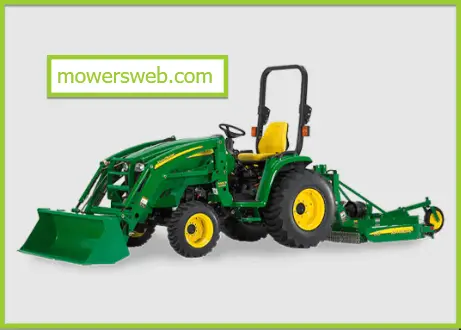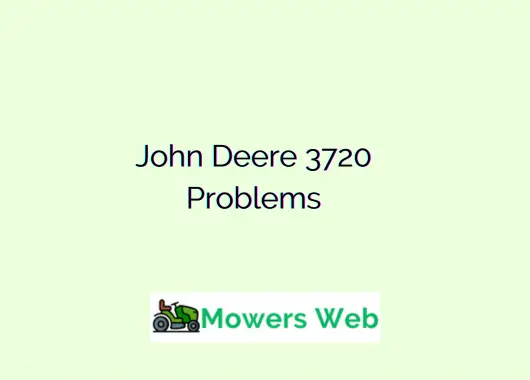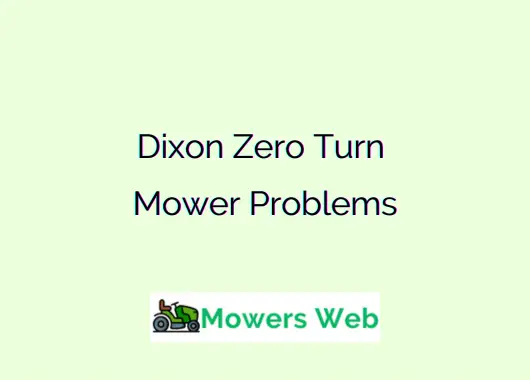When it comes to compact utility tractors, the John Deere 3720 is a popular choice for many farmers and property owners.
Known for its versatility and reliability, the 3720 is equipped with advanced features to handle various tasks efficiently.
However, like any machinery, it may encounter some issues during its operation.
In this post, we will explore common problems that owners may face with the John Deere 3720 and provide valuable troubleshooting tips and solutions.
Let’s get started.

John Deere 3720 Problems
1. Common Electrical Problems
Battery-related Issues
One of the most common problems faced by 3720 owners is battery-related. This may include a dead battery, slow cranking, or frequent battery replacements.
To address this, ensure that the battery connections are clean and secure, and consider investing in a high-quality battery with the appropriate specifications.
Starter Problems
A faulty starter can lead to frustrating delays and downtime. If the engine struggles to start or makes clicking sounds, it may indicate a starter problem.
Regularly check the starter motor and its connections to identify any issues promptly.
Electrical Wiring Faults
Faulty electrical wiring can cause various problems, from malfunctions in lights and gauges to complete engine shutdowns.
Inspect the wiring regularly, looking for signs of wear, damage, or loose connections. Promptly address any wiring issues to prevent further complications.
2. Hydraulic System Malfunctions
Hydraulic Leaks
Hydraulic leaks can lead to a loss of hydraulic fluid, resulting in reduced performance and potential damage to the system.
Inspect hydraulic hoses, fittings, and seals for leaks regularly. Replace worn-out components and use high-quality hydraulic fluid to prevent leaks.
Unresponsive Hydraulics
If the hydraulics fail to respond or operate sluggishly, it may indicate a problem with the hydraulic pump, valves, or filters.
Regularly check and maintain the hydraulic system, and promptly address any signs of reduced performance.
Slow Hydraulic Response
A slow hydraulic response can hamper productivity and efficiency. Ensure that the hydraulic fluid is clean and at the correct level, and inspect the hydraulic pump for any malfunctions.
Read John Deere MFWD Problems(5 Easy Ways To Fix)
3. Transmission Problems
Gear Shifting Issues
Transmission problems can manifest as difficulty shifting gears or gear slippage.
If you experience grinding noises or the gears do not engage smoothly, there might be an issue with the clutch or transmission linkage.
Have a qualified technician inspect and adjust the clutch and transmission components.
Transmission Noise
Unusual noises emanating from the transmission could indicate problems with the gears or bearings.
Low or contaminated transmission fluid can also contribute to noise issues. Regularly check the transmission fluid level and quality, and replace it if necessary.
Transmission Slipping
Transmission slipping occurs when the tractor unexpectedly changes gears while in motion or fails to stay in gear.
Low transmission fluid, a worn-out clutch, or a malfunctioning solenoid can all be the cause of this. Address the issue promptly to prevent further damage to the transmission.
Read 5 Common John Deere 2150 Problems(With Solutions)
4. Steering and Braking Difficulties
Poor Steering Response
If the steering feels loose or unresponsive, it might be due to worn-out steering components, low hydraulic fluid, or improper wheel alignment.
Check the steering system regularly and ensure that the hydraulic fluid level is within the recommended range.
Brake Failure
Brake issues are critical for the safety of the operator and others.
If the brakes feel spongy or unresponsive, or if you notice fluid leaks near the wheels, do not operate the tractor until the problem is fixed. Have the brakes inspected and repaired by a professional immediately.
Uneven Braking
Uneven braking can cause the tractor to pull to one side during braking. A misaligned brake caliper or unevenly worn brake pads can be the cause of this. Address the issue promptly to ensure balanced and safe braking performance.
5. PTO (Power Take-Off) Failures
PTO Engagement Problems
If the PTO fails to engage or disengage properly, it may indicate issues with the PTO clutch or a faulty switch.
Check the PTO components regularly and perform any necessary maintenance or replacements.
PTO Clutch Troubles
A slipping or noisy PTO clutch can lead to reduced efficiency and power transfer. Inspect the PTO clutch regularly and adjust or replace it as needed to ensure proper functioning.
PTO Shaft Issues
A bent or damaged PTO shaft can cause vibrations and reduce power output. Inspect the PTO shaft regularly and replace it if any issues are detected.
Read 7 Common John Deere 4455 Problems(With Solutions)
6. Tire and Wheel Concerns
Tire Wear and Tear
Excessive tire wear can impact traction and stability. Regularly inspect the tires for signs of wear and replace them if the tread depth is below the recommended limit.
Flat Tires
Flat tires can halt your work abruptly. Check the tires for punctures or damage regularly, and keep them properly inflated to prevent flats.
Wheel Alignment
Improper wheel alignment can cause uneven tire wear and affect the tractor’s handling. Have the wheel alignment checked and adjusted by a professional to ensure optimal performance.
7. Fuel System Challenges
Fuel Contamination
Contaminated fuel can clog the fuel system, leading to engine performance issues.
Use clean and filtered fuel to prevent contamination, and regularly inspect the fuel system for any signs of dirt or debris.
Fuel Pump Problems
A malfunctioning fuel pump can disrupt the fuel supply to the engine, resulting in poor performance or stalling. Regularly inspect the fuel pump and have it replaced if necessary.
Fuel Efficiency Issues
If you notice a sudden drop in fuel efficiency, it may indicate fuel system problems or engine issues. Monitor your tractor’s fuel consumption and consult a professional if you suspect any problems.
Read 17 Common John Deere 4850 Problems(With Solutions)
8. Cooling System Malfunctions
Radiator Blockages
A clogged radiator can cause the engine to overheat. Regularly clean the radiator and check for any blockages that might hinder proper cooling.
Coolant Leaks
Coolant leaks can lead to engine overheating and potential damage. Inspect the cooling system regularly and repair any leaks promptly.
Fan Malfunctions
The cooling fan plays a crucial role in maintaining optimal engine temperature. Check the fan regularly and replace it if it’s not functioning correctly.
9. Operator Errors and Maintenance Mistakes
Incorrect Operating Procedures
Improper operation of the tractor can lead to premature wear and malfunctions. Ensure that all operators are adequately trained on the proper use of the 3720 and follow the manufacturer’s guidelines.
Neglecting Regular Maintenance
Skipping routine maintenance can lead to a host of problems. Follow John Deere’s recommended maintenance schedule and take care of any issues right away.
Improper Storage Practices
Improperly storing the tractor can expose it to harsh weather conditions and damage. Store the 3720 in a dry and secure location, and consider using a tractor cover to protect it from the elements.
Read 9 Common John Deere 3032e Problems(With Solutions)
10. Software and Display Errors
Display Malfunctions
If the display shows incorrect information or fails to function properly, there might be a software or hardware issue. Update the software and inspect the display regularly for any anomalies.
Software Glitches
Software glitches can impact the tractor’s performance and features. Stay up-to-date with the latest software updates and report any unusual behavior to the manufacturer.
Firmware Updates
Regularly check for firmware updates and apply them to enhance the tractor’s functionality and address potential issues.
11. Safety and Warning Problems
Faulty Safety Switches
Malfunctioning safety switches can pose a safety hazard. Regularly test the safety switches and replace any defective switches immediately.
Inaccurate Warning Indicators
If warning lights or indicators are inaccurate or fail to illuminate when necessary, it can lead to overlooking critical issues. Have the warning system checked and repaired promptly.
Safety Recalls and Bulletins
Stay informed about safety recalls and bulletins issued by John Deere. Address any safety concerns immediately to avoid potential accidents.
Read John Deere D140 Troubleshooting(5 Quick Ways To Fix)
12. Environmental and Weather Influences
Water and Moisture Damage
Exposure to water and moisture can lead to corrosion and damage to electrical components. Avoid using the tractor in heavy rain or wet conditions whenever possible.
Dust and Debris Accumulation
Dust and debris can accumulate on critical tractor components, affecting performance. To prevent damage from dirt and debris, regularly clean the tractor and its engine bay.
Extreme Temperature Impact
Extreme temperatures can strain the tractor’s components. Take appropriate measures during hot or cold weather to ensure the tractor operates optimally.
Read 11 Reasons Why John Deere D110 Won’t Start(Fixed)
Extended Warranty and Customer Support
John Deere Extended Warranty Program
Consider the benefits of the John Deere Extended Warranty Program to extend coverage and protect your investment.
Customer Support and Assistance
John Deere offers excellent customer support and assistance. Reach out to their customer service for help with troubleshooting or any concerns.
Authorized Service Centers
For complex repairs and professional assistance, rely on authorized John Deere service centers to ensure your tractor is in expert hands.
Final Remarks
Owning a John Deere 3720 comes with the assurance of a reliable and versatile compact utility tractor.
While encountering problems is inevitable, addressing them promptly and properly maintaining the tractor can keep it running at peak performance.
Regular inspections, routine maintenance, and following safety guidelines are essential to getting the most out of your John Deere 3720.
Read 10 Common John Deere 185 Hydro Problems(With Solutions)
FAQs
How to prevent battery-related problems with John Deere 3720?
To prevent battery-related problems, ensure that the battery connections are clean and secure.
Invest in a high-quality battery with the appropriate specifications and consider using a battery tender during extended periods of inactivity.
What should I do if I notice hydraulic leaks on my 3720?
If you notice hydraulic leaks, identify the source and severity of the leak. Replace worn-out components or seals promptly, and use high-quality hydraulic fluid to prevent future leaks.
Why is John Deere 3720 experiencing engine misfires?
Engine misfires can be caused by various factors, including a clogged fuel filter, spark plug issues, or ignition system problems.
Have a qualified technician inspect and diagnose the engine to determine the exact cause and perform the necessary repairs.
Can I perform routine maintenance on my 3720 myself, or should I seek professional help?
While some routine maintenance tasks can be performed by the owner, it is essential to follow the manufacturer’s guidelines and recommendations.
For more complex issues and scheduled maintenance, it is advisable to seek professional assistance from authorized service centers.
Is the John Deere Extended Warranty Program worth considering?
The John Deere Extended Warranty Program provides additional coverage beyond the standard warranty period, offering peace of mind and protection against unexpected repair costs.
Depending on your usage and needs, it may be a worthwhile investment to safeguard your tractor for an extended period.




